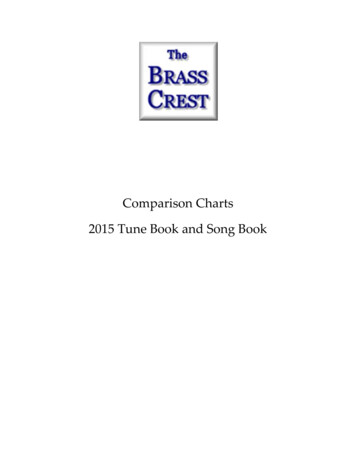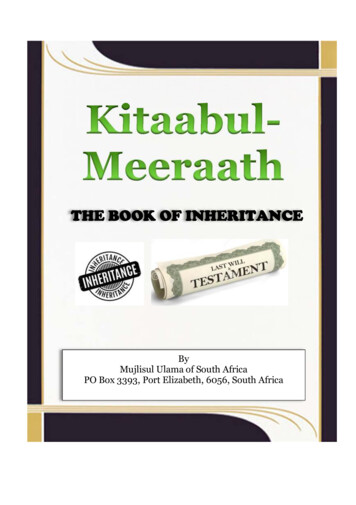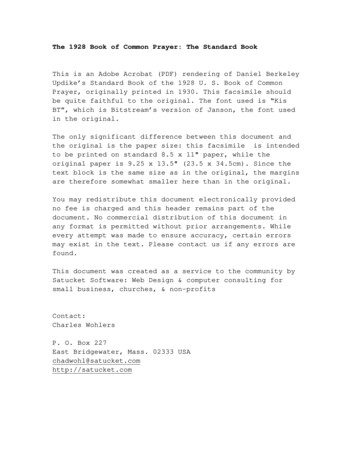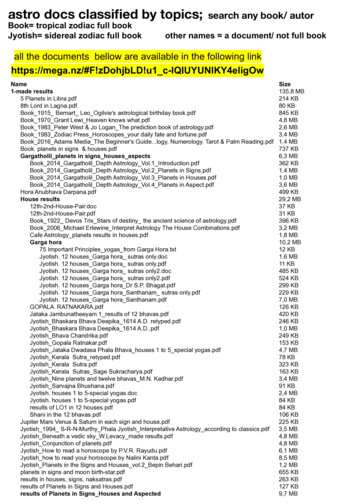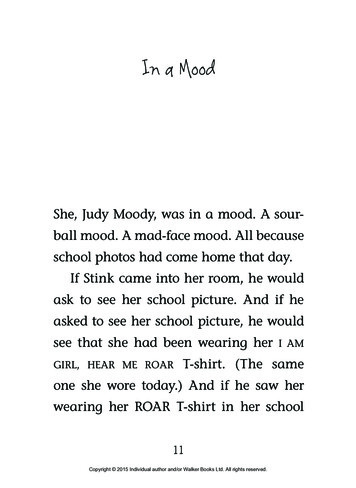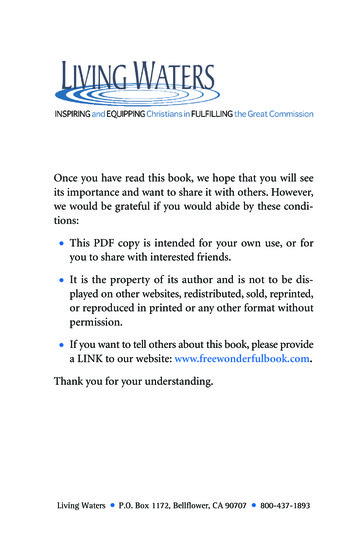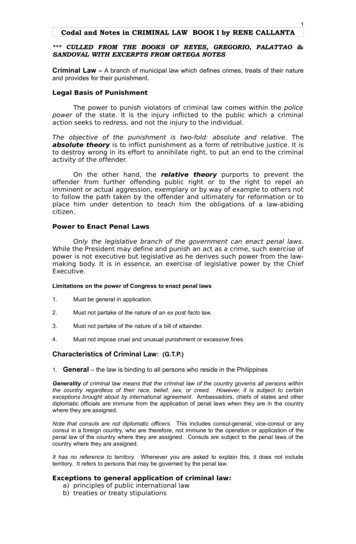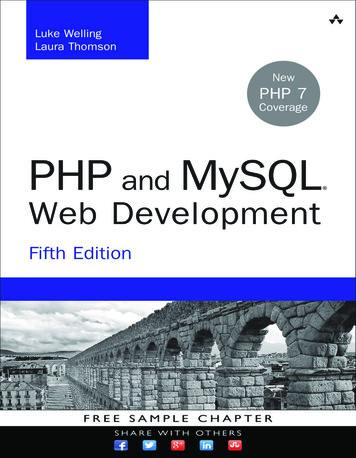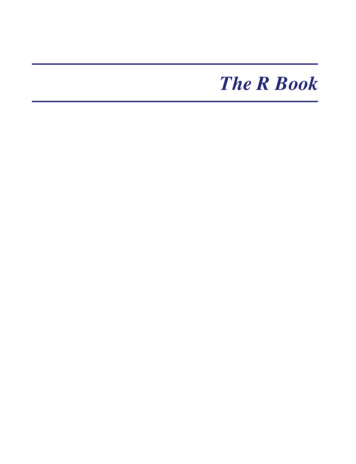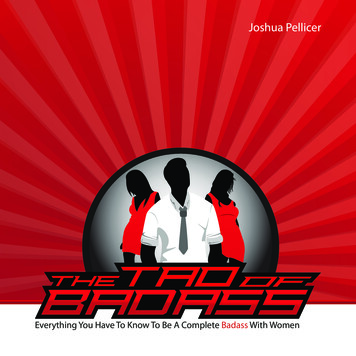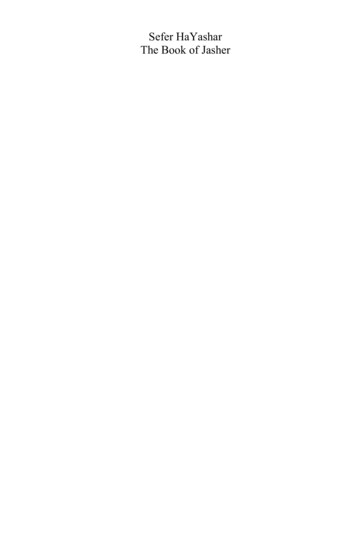
Transcription
Sefer HaYasharThe Book of Jasher
2
r#yh rpsSefer HaYashar“The Book of Jasher”orThe Upright BookReferred to inYahushua and Second SamuelTranslatedfrom the Original HebrewByJames Scott Trimm"Is not this written in the Book of Jasher?"--Yahushua, x. 13."Behold it is written in the Book of Jasher."--II Samuel, i. 18Published by:The Institute for Nazarene Jewish StudiesPO Box 471Hurst, TX 76053http://www.nazarene.co.nr3
Copyright 2008 James Scott Trimm4
Table of ContentsIntroductionHebrew PrefaceBook of Jasher1840 Translator’s Preface1840 Publisher’s Preface1625 Printer’s Preface71151254975075135
6
IntroductionThe Book of Jasher is one of the so-called "Lost Books" ofthe Bible and is twice cited in the Tanak:"Is not this written in the Book of Jasher?"(Yahushua 10:13)"Behold it is written in the Book of Jasher."(2Sam. 1:18)The term "Book of Jasher" is a bit misleading. This was nota book written by someone named "Jasher". In fact the word"Jasher" (Hebrew: Yashar) means "Upright" so that theHebrew Sefer HaYashar is "The Upright Book". Thedefinite article "Ha" tips us off that this is not a person'sname but a modifier for the word "book". There are tworeferences to Jasher in the Tanak: "And the sun stood still,and the moon stayed, until the people had avengedthemselves upon their enemies. Is not this written in thebook of Jasher? So the sun stood still. (Yahushua 10:13)(Also he bade them teach the children of Y’hudah the use ofthe bow: behold, it is written in the book of Jasher.) (2Samuel 1:18) From these two references in the Tanak thereare several things we can learn about this mysterious book.From the usage in Yahushua 10:13 we can determine:1. That Jasher contained the account of the prolongedday mentioned in Yahushua 10.2. That Jasher was in circulation by the time the bookof Yahushua was written. Since Yahushua was writtenprior to the death of Rahab, Jasher must have beenwritten by that time as well.7
3. The Book of Jasher had enough credibility thatYahushua would cite it as support for his assertion ofthe prolonged day. The usage in 2Sam. 1:18 tells us:4. The Book of Jasher supported an admonition toteach the son's of Y’hudah "the bow". The identity ofthis lost book has been a matter of much speculationover the centuries.The ancient translations and paraphrases offer little help tous in identifying the Book of Jasher. The Greek LXX omitsthe entire phrase from Yahushua 10:13 and translates the thephrase to mean "The Book of the Upright" in 2 Sam. 1:18.The Latin Vulgate has in both places "Liber Justorum" "TheBook of the Upright Ones". In the Targums the phrase isParaphased as "The Book of the Law". The Aramaic PeshittaTanak has "The Book of Praises" in Yahushua 10:13 and"The Book of the Song" in 2 Sam. 1:18. This may haveresulted from a misreading of r#y (Upright) as ry# (Song).And some have speculated that the book in question wasactually a book of songs which included reference toYahushua 10:13 in the lyrics of a song. This theory alsotakes "the bow" in 2 Sam. 1:18 to be the name of a song.Jasher and the TalmudThe Talmud discusses the identity of Jasher but also fails tooffer us much real direction. In b.Avodah Zarah 25a severaltheories for the identity of the Book of Jasher are proposed.Rabbi Chiyya ben Abba taught in the name of RabbiYochanan that it is "the book of Avraham, Yitz’chak andYa’akov" who are called "righteous". He seems to refer to8
Genesis since he sites Gen. 49:8 as the reference to Y’hudahbeing taught "the bow". Rabbi Eleazar identified Jasher asDeuteronomy based on Deut. 4:18. He cites Deut. 33:7 asthe reference to Y’hudah and archery. Rabbi Samuel benNachmani identified Jasher as the book of Judges based onJudges 17:6.He found the reference to Y’hudah and archery in Judges3:2 & 1:1-2. None of these explanations offered by theTalmudic rabbis seek to explain how any of these biblicalbooks could have been referenced by Yahushua 10:13(especially Judges which was written after Yahushua).Could these Rabbis have used a text of Yahushua whichagreed with the LXX in omitting reference to the Book ofJasher? At any rate if we accept the reference to Jasher inYahushua 10:13 then we must reject these identifications ofJasher made in the Talmud. While the Rabbis of the Talmudseem to have lost knowledge of the identity of the Book ofJasher, its identity was known to earlier generations.Josephus on JasherIn his own recounting of the event of the prolonged day ofYahushua 10 the first century Jewish Roman historianJosephus identifies the Book of Jasher mentioned byYahushua as one of "the books laid up in the Temple" (Ant.5:1:17). Thus the Book of Jasher was known to Josephusand was known to be among the books laid up in the Templein the first century.9
The Three Books of JasherThere are at least three books today with the title "Book ofJasher"/"Sefer HaYashar". One of these is a Hebrew bookwhich was never intended to be identified with the SeferHaYashar or the Bible. (Remember Sefer HaYashar means"The Upright Book").Another "Book of Jasher" is a very bad English forgerypublished first in 1751 and again in 1829. This versionclaims to be written by a man named "Jasher". This forgeryopens with the phrase "Whilst it was the beginning, darknessoverspread the face of nature." Reprints of this forgery stillcirculate today.The "Book of Jasher" presented in this volume waspublished in Hebrew in Venice in 1625, translated intoEnglish by Mosheh Samuel and published by MordechaiNoah in New York in 1840. It was Mosheh Samuel whofirst divided the work into chapter and verse (being 91chapters.)A second edition of this translation was published in SaltLake City by J. H. Parry & Company in 1887. Both editionshave been reprinted and republished several times. In 1954Bible Corporation of America in Philadelphia reprinted the1840 edition. They also translated it from English intoItalian, Spanish, French and German for publication in thoselanguages as well.There has been some debate as to whether this Book ofJasher is the book mentioned in the Bible or just a Midrashwhich some have speculated originated in the 13th century.Certainly the book claims to be the same Book of Jasher10
mentioned in the Bible.The Real Book of Jasher?The 1625 edition of Jasher has a Preface, which says in part(translated from the Hebrew):.when the holy city Jerusalem was destroyed byTitus, all the military heads went in to rob andplunder, and among the officers of Titus was onewhose name was Sidrus, who went in to search, andfound in Jerusalem a house of great extent.According to the preface this Sidrus found a false wall inthis house with a hidden room. In this room he found an oldman hiding with provisions and many books including theBook of Jasher The old man found favor with Sidrus whotook the old man and his books with him. The preface says"they went from city to city and from country to countryuntil they reached Sevilia [a city in Spain]." At that time"Seville" was called "Hispalis" and was the capital of theRoman province of Hispalensis. The manuscript wasdonated to the Jewish college at Cordova, Spain. Accordingto the 1625 edition of Jasher the first printed edition of theBook of Jasher was published in Naples Italy in 1552.However no copies of the 1552 edition are known to havesurvived. The earliest surviving Hebrew edition known isthe 1625 edition.The Book of Jasher is a narrative beginning with thecreation of man and ends with the entry of Israel intoKanaan. The Book of Jasher passage related to Yahushua10:13 reads as follows:11
"And when they were smiting, the day was decliningtoward evening, and Yahushua said in the eyes of allthe people, Sun, stand thou still upon Givon, and thoumoon in the valley of Ajalon, until the nation shallhave revenged itself upon its enemies. And the Lordhearkened to the voice of Yahushua, and the sun stoodstill in the midst of the heavens, and it stood still sixand thirty moments, and the moon also stood still andhastened not to go down a whole day."(Jasher 88:63-64)The Book of Jasher passage which relates to 2 Sam. 1:18involves Ya’akov's last words to his son Y’hudah:"Only teach your sons the bow and all weapons ofwar, in order that they may fight the battles of theirbrother who will rule over his enemies."(Jasher 56:9)This reads very similar to the midrash which gives these lastwords as:"You, my son, are stronger than all your brothers, andfrom your loins will kings arise. Teach your childrenhow they may protect themselves from enemies andevil-doers"It would seem that the author of Jasher did not create thisaccount to fit with 2 Sam. 1:18 since the same accountoccurs in the midrash (which itself may have been drawnfrom Jasher). Certainly many serious scholars haveconcluded that this Book of Jasher is authentic.12
The well known Hebraist and Rabbinic Scholar (andtranslator of the 1840 Book of Jasher) Mosheh Samuel wroteof Jasher:".the book is, with the exception of some doubtfulparts, a venerable monument of antiquity; and that,notwithstanding some few additions have been madeto it in comparatively modern times, it still retainssufficient to prove it a copy of the book referred to inYahushua, and 2 Samuel, ch. 1."- Mosheh Samuel - Hebraist and Rabbinic ScholarThe late Dr. Cyrus Gordon (who was the world's leadingSemitist until his death) wrote:"There can be little doubt that the book of Jasher wasa national epic. The time is ripe for a freshinvestigation of such genuine sources of Scripture,particularly against the background of the Dead SeaScrolls."- Dr. Cyrus Gordon; A History of the HebrewsThere is some evidence to suggest that the Book of Jasherwas a sort of secular History of the Hebrews. Although theBook of Jasher acknowledges the hand of Elohim, itspurpose seems to be largely historical. The Book of Jasherwas an official historical record of events from the creationof Adam to the entry of Israel into the Promised Land. Thiswould explain why Yahushua would appeal to the Book ofJasher to support the fact that the prolonged day ofYahushua 10 actually happened. Yahushua was appealing tothe "official record" and not to a theological book as-such.The Hebrew preface to Jasher records that when Ptolemyking of Egypt first sought from the Jews a copy of the Torah13
they sent him instead the Book of Jasher "for they could notgive him the book of the Lord" but later he learned whatthey had done and they then provided for him the LXX. Atthe very least we have in Jasher an important collection ofJewish legends related to this time period.James Scott Trimm14
Moses Samuel’sEnglish Translationof theHebrew PrefaceTHIS BOOK IS THAT WHICH IS CALLED THE UPRIGHT BOOKIt has at this time been ascertained by us that when theholy city Jerusalem was destroyed by Titus, all the militaryheads went in to rob and plunder, and that amongst theofficers1 of Titus was one whose name was Sidrus, whowent in to search, and found in Jerusalem a house of greatextent, and took away all the spoils which he found there;when he wished to go out of the house, he looked at the walland fancied that he saw treasures there, so he broke downthe wall and the building and found a cask full of variousbooks of the Law, the Prophets, and the Hagiographa,2 alsobooks of the kings of Israel, and of the kings of othernations, as well as many other books of Israel, together withthe books of the Mishnah adopted and established; manyrolls were also lying there; he also found there all sorts ofprovisions and wine in abundance, and discovered an oldman sitting there, who was reading in those books. Whenthe officer saw this great sight he was greatly astonished,and said to the old man, why dost thou sit alone in this place,without any person remaining with thee? So the old mananswered, for many years past was I aware of this seconddestruction of Jerusalem, so I built this house and made for1Nwmgh Buxton gives this word “episcopus” which, besides a bishop, means also alieutenant, overseer, superintendent. See Arach.2Psalms, Proverbs, &c.15
myself a balcony,3 and I brought with me these books toread, and I brought also sufficient provisions, thinkingthereby to4 save my life.And God caused the old man to find favor in the eyesof the officer, who brought him forth with respect with allhis books, and they went from city to city and from countryto country until they reached Sevilia; and the officer foundthat this old man was possessed of wisdom andunderstanding and acquainted with various kinds of science,upon discovering which he raised and honored him, wasconstantly in his house and was taught by him all sorts ofwisdom, and they built form themselves a lofty andcapacious house in the suburbs of Sevilia and placed thereall those books.This house is yet in Sevilia unto this day, and theywrote there all the events that would hereafter take placeamongst the kings of the world unto the coming of ourMessiah.And it came to pass that when God carried5 us awaywith a mighty captivity by the hands of the kings of Edom,from city to city and from country to country in bitteranxiety, this book, called “The Generations of Adam”together with other books came into our hands, for theycame from that house in Sevilia, and they came afterward toour city Napuli, which city is under the sway of the king ofSpain, (whose glory may be exalted.) And when we sawthese books, that they were books of all wisdom, weresolved in our minds to print them like all the books that3hrdsk) or porch, a Talmudical word derived from the Greek. See Arach.See Jeremiah 38:2, the same expression.5See same expression, Isaiah 22:17.416
came to our hands. Now this book is the best and mostvaluable of all, and of this book twelve copies have reachedus, and we searched in them and found them all of one copy,there was no difference, nothing added and nothingdeficient, nor any alteration in letters, words or events, forthey were all alike as it were of one copy.Since therefore, we saw in this book great meriturging us to this resolve, we are determined to print it – andit is found written that this book is called the Book Jasher,because all its transactions are in that order as they had takenplace in the world as regards priority and succession, forthou wilt not find in this book any postponement of eventsthat were anterior, or priority of those that were posterior,but every thing is recorded in its place and time.Thou wilt thus find that it relates the death of such aone at the particular time of the life of another and thusthroughout. Owing to this it was called Sepher Hajashar,but it is customary to call it the Generations of Adam, thereason of which is that they call it by that with which itcommences, but the chief name thereof is the book “Jasher”owing to the reasons we have assigned. Now it is found thatthis book is translated into Greek, entitled “Lo libris de losdivtiis,”It is also found written in the book of the Asmoneanswhich has come down to us, that in the days of Ptolemy kingof Egypt, he ordered his servants to go and gather all thebooks of laws, and all the books of Chronicles which theycould finding the world, so that he might become wisethrough them, and by examining them become acquaintedwith the subjects and events of the world, and to compilefrom them a book in all matters of jurisdiction regarding the17
affairs of life, thereby to exercise pure justice. So they wentand collected for him nine hundred and sixty five books andbrought to him, when commanded them to go again and seekto complete the number of a thousand books, and they didso. After this, some of the persecutors of Israel stood upbefore him and said, O king, why wilt though trouble thyselfin this manner? Send to the Jews in Jerusalem that theyshall bring unto thee the book of their law which was writtenfrom them from the mouth of the Lord by their Prophets,from which thou mayest become wise, and regulate alljudgments and laws according to they desire; so the kinghearkened to their works, and sent to the Jews upon thismatter, who sent to him this book, for they could not giveunto him the book of the Lord, for they said, we cannot givethe law of the Lord to a stranger. Now when this book cameto the hands of Ptolemy he read it and it please him greatly,and he searched therein in his wisdom, and he examined itand found therein what he had desired, and he neglected allthe other books which they had collected for him, and heblessed him who had advised him to this thing.After some time the persecutors of Israel becameaware of this, that the Israelites had not sent the book of thelaw to the king, and they came and said unto him, O king,the Israelites have treated thee with contempt, for they didnot send to thee the book of the law which we hadmentioned to thee, but they sent to thee another book whichthey had in their hands, therefore send to them that they mayforward unto thee the book of their law, for from that bookthou wilt obtain they desire much more than from the bookwhich they have sent to thee; so when the king heard theirwords he became exceedingly wroth against the Israelites,and his anger burned within him until he sent again to themfor them to forward to him the book of the law. Fearing that18
they might still continue to scorn him, he acted prudentlywith them and sent to seventy of their elders and placedthem in seventy house, that each should write the book ofthe law, so that no alteration might be found in them, and thedivine spirit rested upon them, and they wrote for himseventy books and they were all of one version, withoutaddition or diminution. At this the king rejoiced greatly andhe honored the elders, together with all the Jews, and he sentofferings and gifts to Jerusalem as it is written there.6 At hisdeath, the Israelites acted cunningly with his son and tookfrom his treasures the book of the law, but left this bookthere and took it not away, in order that every future kingmight know the wonders of the Lord, blessed be his name,and that he had chosen Israel from all nations, and that thereis no God beside him.This book is therefore in Egypt unto this day, andfrom that time it became circulated throughout the earth,until it reached us in our captivity this day in the city ofNapuli, which is under the rule of the king of Spain. Nowthou wilt find in this book that some of the kings of Edom,of Chittim and the kings of Africa who were in those days,are mentioned, although it might appear that such was notthe aim or intent of this book; but the reason of this was toshow to every person obtaining this book the contrastbetween the wars of Israel and the wars of the Gentiles, forthe conquest of Gentile kings one over the other was byaccident, which is not so in the conquest of the kings ofIsrael over the Gentiles, which is by a miracle from ourblessed Lord as long as the Israelites trust in his exaltedname.6In the book of the Asmoneans mentioned above.19
Now the uses of this book are many, all of which leadus to confidence in God, (whose name be exalted,) and toour adherence unto him and his ways.The first use is the additional information it affords usupon the subjects of the creation of man and the deluge,recording also the years of the twenty generations and theirmisdeeds; also at what period they were born and when theydied, by which means, our hearts may be inclined to adhereto the Lord, when we see the mighty works which heperformed in days of old.The second use is in the additional account respectingthe birth of Abraham and how it was that he cleaved to theLord, and the transactions that took place between him andNimrod; and thus also of the account of the builders of thetower of Babel,7 how that the Lord drove them to the fourcorners of the earth, and how they established the countriesand lands called after their names unto t his day, by whichmeans we may draw nigh to our Creator.The third use is the explanation it gives us how thepatriarchs adhered to the Lord, and of their transactionswhich convince us of their fear of God.The fourth use is, in what it records of the affairs ofSodom and the iniquities of its people, and in what consistedtheir sins, as well as their punishment, by which means wemay refrain from all evil doings.The fifth use is in the account of the faith of Isaac andJacob in the Lord, and the prayers and weeping of Sarah at7Called hglph rwd because the earth was then divided.20
the binding of Isaac for a sacrifice, which is of great use ininclining our hearts to the service of the Lord.The sixth use is in the information it affords us uponthe subject of the wars of the sons of Jacob with the peopleof Shechem and the seven cities of the Amorites. This willrouse our heart to faith in our God; for how could ten mendestroy seven cities, if their hearts had not been impressedwith faith in the Lord?The seventh use is, in the information it gives us of allthe events that happened to Joseph in Egypt, with Potipharand his wife and with the king of Egypt, for this will alsorouse our hearts to the fear of the Lord, and to removeourselves from all sin, so that it may be well with us in thelatter end.The eighth use is in the account it furnishes us of whathappened to Moses in Cush and in Midian, by which wemay understand the wonders of Lord which he performs forthe righteous, and that we may thereby adhere to him.The ninth use is in its recording what had happened tothe Israelites in Egypt, and when the commencement of theirservitude took place, and how they served the Egyptians inall manner of hard work, and to what purpose all this tended– how after this God was favorable to them through theirtrusting in him, and there is no doubt of this that he whoreads the events of Egypt from this book on the nights of thePassover, will receive a great reward, as our Rabbins ofblessed memory says, he that is occupied in relating the exitfrom Egypt is to be praised, in which this book is included,for this is the true narration which ought to be read after theHagadah, for such person (reading this) may be assured that21
he will be greatly rewarded; we do so this day in ourcaptivity in the countries of Spain, after having finishedreading the Hagadah, we commence reading in this book thewhole affair of Egypt, from the Israelites going down toEgypt unto their exit, for in this book a person ought to read.The eleventh8 use is, that some of the comments ofour Rabbies and of other commentators who have explainedthe law, thou wilt find illustrated in this book, such as theaccount of the messengers who met Jacob9 when he camefrom Mesopotamia after they had gone to Esau, also theaccount of Gabriel who taught Joseph seventy languages,also the illustration it affords of him10 who smote Midian thefields of Moab, and the like.The twelfth use is, that every person lecturing inpublic may bring forward in his discourse, subjects from thisbook, which the commentators have not explained, by whichmeans he may make an impression upon the hearts of hisaudience. The thirteenth use is, that all merchants andtravelers, who have an opportunity to study the law, mayread this book and receive their reward, for therein is thereward of the soul as well as the delight of the body, in thediscovery of new matter not recorded in any other book, andby these means will man understand to know the Lord andcleave unto him.Now because we have seen the merit of this book, andthe great usefulness thereof, we have undertaken to print it8The eleventh use.—I cannot see any mention of the tenth use; this must have beenomitted. I think, before the words above, “how after this God was favourable tothem through their trusting in him.”9See the latter part of ch. 31.10The obscure passage in Genesis, 36:35 in the Bible, is cleared up in Jasher, ch. 62where it gives a long history of Hadad, the son of Bedad.22
without addition or diminution, and from this time we havecommenced to print it in a book, that such books may be inthe hands of the members of our covenant, the men of ourcaptivity in order that it may be farther circulated throughoutevery generation, and every city, family and country, so thatthey may understand the wonders of the Lord which heperformed for our ancestors, and his bounties toward themfrom the days of old, and that he chose us from all nations.May they who devote their hearts to the fear of the Lord, berendered meritorious by studying therein whilst we confidein the Lord, the God of gods, and depend upon him and seeksalvation and assistance from him, in this heavenly work,and may he prosper us in the right path, and deliver us fromerrors, and cleanse us from secret faults, as his anointed said,“who can understand his errors? Cleanse thou me fromsecret faults.”11 May God teach us the good way and directus in a prosperous path for the sake of his mercies andkindnesses, and may he graciously fulfill the desire of ourhearts, Amen, and so be his will.11Psalms, 19:1223
24
r#yh rpsThe Book of JasherParshat B’reshitThis is the Book of the Generations of Man whom ElohimCreated upon the earth on the day when YHWH Elohimmade the Earth and Heaven.CHAPTER 11 And Elohim said, Let us make man in our image, after ourlikeness, and Elohim created man in his own image.2 And YHWH Elohim formed man from the dust of theearth, and he breathed into his nostrils the breath of life, andman became a living soul [endowed] with speech.3 And YHWH said, It is not good for the man to be alone; Iwill make him a help meet.4 And YHWH caused a deep sleep to fall upon the man, andhe slept, and he took one of his ribs, and he built flesh uponit, and formed it and brought it to the man, and Adam awokefrom his sleep, and behold a woman was standing beforehim.5 And he said, This is a bone of my bones and it shall becalled woman, because this has been taken from man; andthe man called her name Havah, because she was the motherof all living.6 And Elohim blessed them and called their names Adam[and Havah] in the day that he created them, and YHWHElohim said, Be fruitful and multiply and fill the earth.7 And YHWH Elohim took the man and his wife, and he putthem in the garden of Eden to dress it and to keep it; and hecommanded them and said unto them, Of every tree of the25
garden you may eat, but from the tree of the knowledge ofgood and evil you shall not eat, for in the day that you eatthereof you shall surely die.8 And when Elohim had blessed and commanded them, hewent from them, and the man and his wife dwelt in thegarden according to the command which YHWH hadcommanded them.9 And the serpent, which Elohim had created with them inthe earth, came to them to incite them to transgress thecommand of Elohim which he had commanded them.10 And the serpent enticed and persuaded the woman to eatfrom the tree of knowledge, and the woman hearkened to thevoice of the serpent, and she transgressed the word ofYHWH, and took from the tree of the knowledge of goodand evil, and she ate, and she took from it and gave also toher husband and he ate.11 And the man and his wife transgressed against thecommand of Elohim which he commanded them, andElohim knew it, and his anger was kindled against them andhe cursed them.12 And YHWH Elohim drove them in that day from thegarden of Eden, to till the earth from which they were taken,and they went and dwelt at the east of the garden of Eden;and Adam knew Havah his wife and she bore two sons andthree daughters.13 And she called the name of the firstborn Kayin, saying, Ihave obtained a man from YHWH, and the name of thesecond she called Havel, for she said, In vanity we came intothe earth, and in vanity we shall be taken from it.14 And the boys grew up and their father gave them apossession in the land; and Kayin was a tiller of the earth,and Havel a keeper of sheep.15 And it was at the expiration of days and years, that theybrought an approximating offering to YHWH, and Kayin26
brought from the fruit of the earth, and Havel brought fromthe firstlings of his flock from the fat thereof, and YHWHturned and inclined to Havel and his offering, and a firecame down from YHWH from heaven and consumed it.16 And unto Kayin and his offering YHWH did not turn,and he did not incline to it, for he had brought from theinferior fruit of the earth before YHWH, and Kayin wasjealous against his brother Havel on account of this thing,and he sought a matter to slay him.17 And in some time after, Kayin and Havel his brother,went one day into the field to do their work; and they wereboth in the field, Kayin was tilling and ploughing his earth,and Havel feeding his flock; and the flock passed that partwhich Kayin had ploughed in the earth, and Kayin wassorely grieved about this thing.18 And Kayin approached his brother Havel in anger, and hesaid unto him, What is there between me and you, that youcome to dwell and bring your flock to feed in all my land?19 And Havel also answered his brother Kayin and said untohim, What is there between me and you, that you shall eatthe flesh of my flock and clothe yourself with their wool?20 And now therefore, put off the wool of my sheep withwhich you have clothed yourself, and recompense me fortheir fruit and flesh which you have eaten, and when youshall have done this matter, then also will I go from yourland as you have said. Either fly in the heavens or eat?21 And Kayin said to his brother Havel, Surely if I slay youthis day, who will require your blood from me?22 And Havel answered Kayin, saying, Surely Elohim whohas made us in the earth, he will avenge my cause, and hewill require my blood from you if you should slay me, forYHWH is the judge and arbiter, and it is he who will requiteman according to his evil, and the wicked man according tothe wickedness that he may do upon earth.27
23 And now, if you should slay me here, surely Elohimknows your secrets, and will judge you for the evil whichyou did declare to do unto me today.24 And
Book of Jasher was published in Naples Italy in 1552. However no copies of the 1552 edition are known to have survived. The earliest surviving Hebrew edition known is the 1625 edition. The Book of Jasher is a narrative beginning with the creation of man and ends with the entry of Israel into Kanaan. The Book of Jasher passage related to YahushuaFile Size: 954KB
